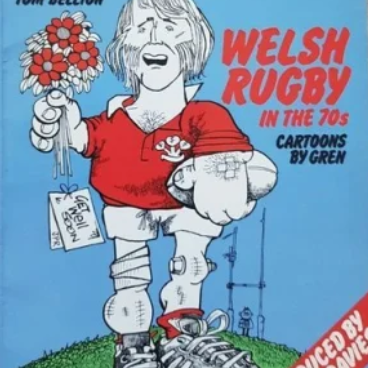
The 1993 Rugby World Cup Sevens was held at Murrayfield from 16th to 18th April 1993. It was three lightning days of live rugby on TV and the first ever Sevens World Cup. It was held at Edinburgh, a fitting place for the World Cup, as it was in Scotland that Sevens was invented. The ultimate prize of the competition was the Melrose Cup, named after the small Scottish town of Melrose where Sevens was in 1883. It was the biggest Sevens tournament held in Britain since the Scottish Centenary Sevens in 1973.
The Sevens game had recently been resusciated by the Hong Kong 7’s annual tournaments. For the Murrayfield event, the International Rugby Board invited the established rugby union nations but also emerging nations, recognizing the fact that Sevens was a bridge between the developed rugby nations and those whose rugby union traditions were less well established. As a result, 24 nations took part including Taiwan, Korea and Latvia.
The balance of Sevens power had shifted firmly to the Southern Hemisphere. Western Somoa were a force to be reckoned as they had beaten Fiji in the Hong Kong sevens a month before. They had also won the Middlesex Sevens the previous year before beating London Scottish and beat eventual winners England 28-10 in the Group stage. Many big names turned up – David Campese, Willie Ofahengaue, Eric Rush but the real Sevens star was Waisale Serevi of Fiji.
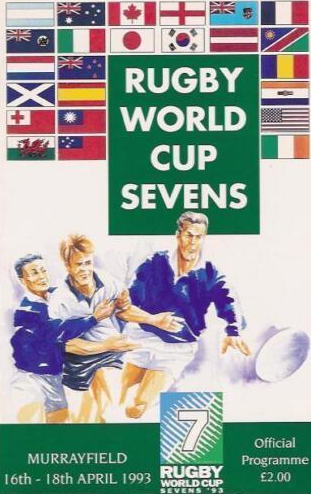
It was a tournament of many shocks. England, although dark horses, defied tremendous odds and were crowned Sevens World Champions in front of 35000 crowd. Ironically, they hadn’t even played in a warm up tournament prior to the World Cup and were not taking the tournament seriously but crucially, England had chosen Seven specialists in Nick Beal, Chris Sheasby and Andrew Merriman and not current internationals as the other countries had. England were also unexpected winners of the inaugural ‘World’ tournament in 1973 but not many expected history to repeat itself.
There were many headlines. Tonga beat Australia; Argentina beat hosts Scotland and last but not least Spain beat Wales!
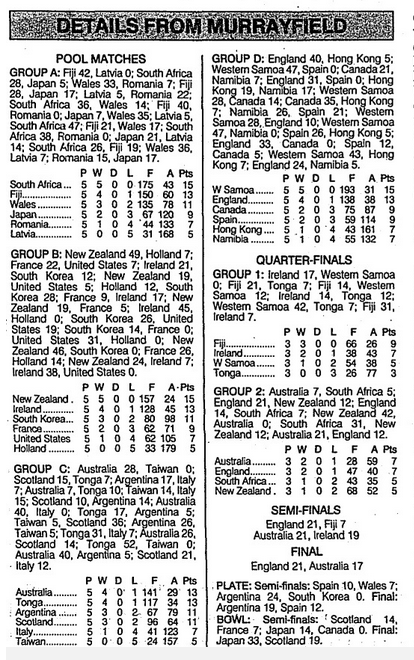
It was mixed fortunes for the Home Nations despite selecting strong squads. It was a dreadful tournament for Scotland as they came fourth in their group and were relegated to play in the Bowl. They reached the final but there was further agony as they lost to Japan, 33-18.
Ireland impressed reaching the Semi Finals beating Western Somoa in the Quarters but losing 21-19 to Australia in the Semis.
The tournament was televised live on ITV to huge fanfare but the tournament did not fulfill expectations. There were poor crowds and the tournament is largely forgotten.

But what about Wales, a team that had high hopes about the competition and sent its superstars!
The Welsh Squad
Of all the Home Nations, on paper, Wales had the stronger squad and was managed by Rob Norster. They even design a new new kit for the event as seen below worn by captian Rupert Moon.
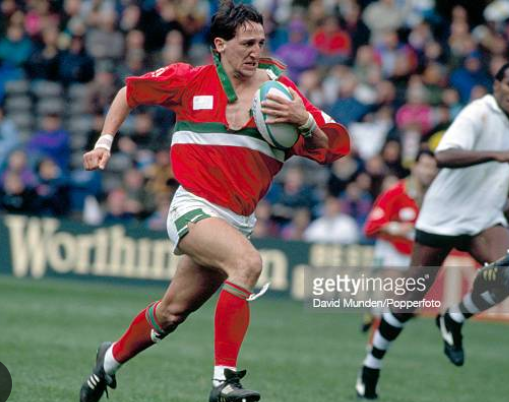
Wales were in Pool A along with Fiji, South Africa, Romania, Japan, Latvia. There were squads of 10 and injured players would be replaced by one from a squad of 20 Scottish players who were on stand by.
The squad was similar to the one chosen for the Hong Kong Sevens. Here they beat Canada, Papua New Guinea before losing 33-7 to Fiji in the Quarter Finals.
Wales Squad: Simon Davies (Swansea), Robert Howley (Bridgend), Neil Jenkins (Pontypridd), Emyr Lewis (Llanelli), Rupert Moon (Llanelli), Mark Perego (Llanelli), Wayne Proctor (Llanelli), Mark Thomas (Rosslyn Park), Aled Williams (Swansea), Andrew Williams (Maesteg)
Nigel Walker was originally selected but pulled out and was replaced by Simon Davies. Scott Gibbs also pulled out of the squad due to flu but was about to make the headlines for the wrong reasons as had been charged with taking a vehicle without the consent of the owner and was charged with drink driving. This was the weekend of Scott Gibbs and the stolen Taxi in Bridgend. Gibbs place in the squad was taken by Neil Jenkins.
Wales 33 Romania 7
The first game was against Romania. Wales were slow off the blocks as it took them until half time to open their scoring against Romania. Rosslyn Park’s Mark Thomas, son of former internartional Clem Thomas, claimed the first try when he crashed over from close range. Neil Jenkins ran 85 yards to score in the corner and Rupert Moon zigzagged a similar distance for his try. Mark Thomas scored a second as he ran 80 yards for his try and Emyr Lewis scored the fifth and last try making it a comfortable wn for Wales.
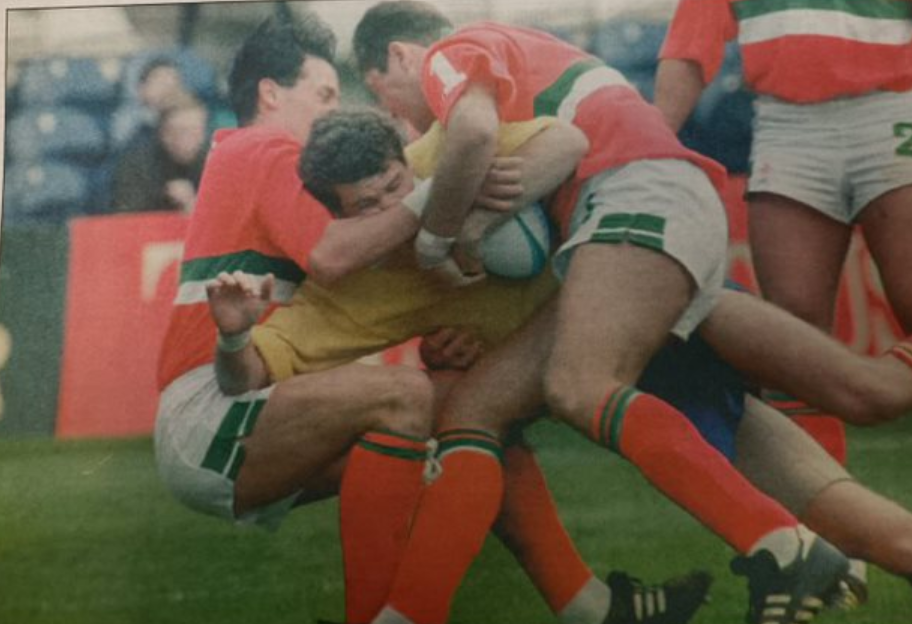
Rupert Moon and Mark Thomas tackle Daniel Neaga of Romania.
South Africa 35 Wales 14
Next up was South Africa. There was history in the making here as it was the first time the two countries met since 1969.
Wales had no answer to South Africa conceding 2 tries each to Joost van der Westhuizen and Andre Joubert. The South African squad also included Chester Williams and Dick Muir who was Assistant coach at Newport from 2002 to 2005. South Africa provided two killer blows within the opening three minutes and scored 36 points as Wales fumbled on for any sort of parity.
There were two tries for Mark Perego and Neil Jenkins but they were nothing more than consolation efforts.
It was clear after the first two games that there was not going to be a fairytale ending for Wales. Some glaring problems let them down. There was lack of overall pace, brittle defence and their inability to turn half chances into seven point scores led to a thumping reverse at the hands of South Africa.
Rupert Moon, the Welsh captain, said:
I thought we had a chance against South Africa but we made a couple of mistakes and from that moment on we were never going to get back into the game.
Now we have to take on and beat Fiji which is going to be hard. If we lose then we will go into the Plate competition and hopefully win that.
The defeat meant they would likely lose out on a Quarter Final place. In fairness to Wales, many would argue that this was the toughest group of the competition.
Wales 35 Japan 7
An early try from Swansea’s Simon Davies replacing Wayne Proctor was followed by a second from Neil Jenkins and a third converted score by Mark Thomas giving Wales a 21-0 interval lead.
Simon Davies scored two further tries, Aled Wlliams converting, gave Wales a 35-0 cushion lead. Japan scored in the final minute making it 35-7.
Japan would go on and beat Latvia and Romania to claim fourth place in the group.
Fiji 21 Wales 17
The Fijians were one of the favourites but Wales put in a performance to be proud of as they ran Fiji close
They played against Waisele Serevi, the star of the Fijian team and possibly one of the most exciting players on the planet who was playing for Japanese side Mitsubishi Dynaboars at the time, the team that Shane Williams ended his career at.
Mark Thomas said:
“We didn’t win the ball in the first four minutes and that meant Serevi could dictate things. He is just so difficult to pin down. He is a brilliant player.”
Suffice to say Serevi played the biggest part in three superb tries, two for scrum-half Fili-moni Seru, a Fijian international who soon left for Rugby League ending up at Hull. The other try was for forward Sekeasi Vonolagai.
It was when Wales were 21-0 down that they began to threaten. Thomas won the race to Aled Williams’s kick-off and from there Wales won a penalty Williams took it on floated a pass to Thomas and after drawing the cover wide he released to the inside where Moon was waiting to canter over. Williams converted superbly. Aled Williams was known as a good Sevens player, a former recipient of the Bill Everson Award for the Man of the Tournament at the Snelling Sevens in 1987.
Aled Williams, from the touchline, then utilised Simon Davies’s speed for the wing to reach the comer with inches to spare Emyr Lewis’s charge at Fiji’s midfield created enough space for Neil Jenkins to release Moon. The Llanelli scrum-half seemed to hold onto the ball a fraction too long but Neil Jenkins was still close enough to the action to send Davies in for his second try. However both Davies tries were scored wide out and Williams failed to convert each of them in the notorious swirling wind of Murrayfield.
Wales 36 Latvia 7
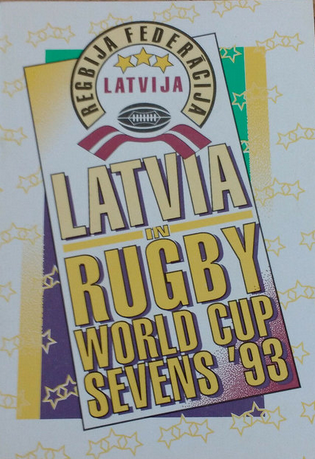
Latvia had already lost 42-0 to Fiji and were a team who had yet to play a 15 a side representative match! The kit were presented to the Latvians by Wayne Shelford at a Edinburgh hotel. They won a Moscow qualifying tournament, the greatest achievement in their history by beating Georgia and Russia. The Latvians were the darling team of the World Cup. Their previous international sevens tournament experience was at the Midnight Sun Festival in Finland!
There were no such worries in Wales’s final pool game as they swamped Latvia 36-7. There were tries for Aled Williams (3) Wayne Proctor and Andrew Williams. Aled Williams converted both leaving Latvia with a consolation try by Nikonovs converted by Veksa Far, which was sevens heaven for Latvia!
Plate Semi Finals Wales 7 Spain 10
Third place teams qualified for the Plate and Wales were favourites to reach the final. However disaster struck as they lost to Spain and found themsleves unexpectedly knocked out of the World Cup!
There was a controversial ending as touch judge blunder discounted Neil Jenkins try. They were trailing 10-0 with 4 minutes to go when Neil Jenkins scored a perfectly legitimate try under the posts. Referee Ffraim Sklar consulted touch judge Jim Fleming who disallowed the try. Alan Davies, the Wales coach, was furious and requested a meeting with match officials.
Alan Davies, Welsh coach, said:
‘Spain had a free kick and kicked the ball into touch. We took the throw, won it, and went over to what we thought was a god try. Mr Fleming however thought the free kick was a penalty and therefore he belived it was a Spanish throw.
The Match officials were ‘very sorry’ which wasn’t much consolation for the Welsh as it was a crucial decision which ultimately cost them the match. The Welsh were very disappointed.
Spain lost 19-12 in the Plate Final to Argentina whi had beaten South Korea in the Semi Final.
England crowned World champions
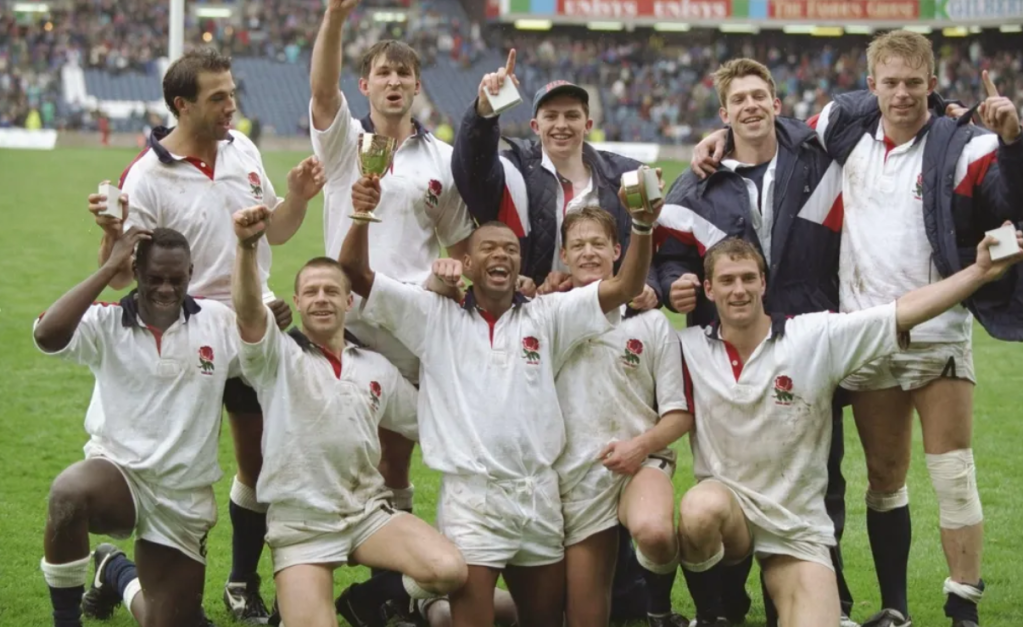
The winners of the 7’s World Cup was darkhorse England. The team of future England starts Laurence Dallaglio, Dawson, Rodber, Sheasby and Rodber beat a Australia team with world class players Lynagh, Campese, Burke and Offahengaue.
It was Sevens heaven for England but Sevens nightmare for Wales!


The Aftermath
The tournament was a disappointment for Wales as they had gone to Murrayfield with high hopes. Wales won the 1994 Five Nations Championship the following year and three of the squad in Murrayfield, would taste success in the 15 man game. However, as is always the case with the WRU, there was an inquest!
Jeff Young, the WRU Technical Director, said:
Prior to the World Cup Sevens I would have seen International sevens tournaments as a base for us to develop young players at a high level. What the World Cup showed that it offers a different scope of challenge, one which we owe it to the Welsh clubs, players and public that we field the best possible team.
The loss to one of the minnows was a shock. Everyone expected Wales to beat Spain. The warning for Wales was not to take anyone for granted. There was also little preperation.
Jeff Young said:
The problem with the World Sevens is neither the players or management had as much preperation as they would like. Yet, n that end, we were not in any differect position to England or Ireland. For the future, it makes only good sense to have a structure to enable the players to prepare more progressively and in a more structured manner for such tournaments.
The current back-up structure in support of the Welsh team gives a new dimension from what has previously been experienced in Welsh rugby. It’s the first year which it has been in operation but would expect to see improvements and results in the foreseeable future’
However, the Welsh defeat didn’t make the back pages headines that monday morning as Wales woke up to a new World Boxing Champion, our first in 26 years, as Steve Robinson was crowned World featherweight champion in Newcastle.
Welsh rugby was about to feature in another first in 1993 as they prepared to visit Namibia and Zimbabwe that summer. Of the 7’s squad, Moon, Jenkins, Proctor, Emyr Lewis and Perego would make the journey as they toured the African continent as Wales exploits in the World Cup was quickly forgotten!
